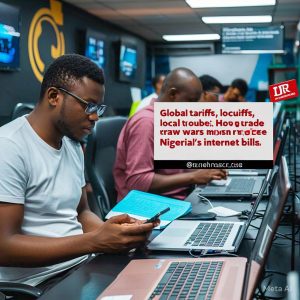Joy Agwunobi
As Nigeria continues to enjoy the rewards of an increasingly connected society, with mobile technology reshaping daily life and expanding digital access, developments on the global stage are drawing attention to the possible implications for the country’s ever-growing telecommunications landscape.
The recent 14 per cent tariff placed on non-oil exports by the U.S. President Donald Trump may not have been directed at Nigeria’s telecom sector, but it’s a development that industry experts say is worth keeping an eye on. They noted that though indirect, the ripple effect of such economic decisions could nudge up the cost of doing business for telecom operators, which will possibly trickle-down effects on call rates, data plans, and service quality.
At the centre of this concern lies the ongoing trade war between the world’s two economic powerhouses—the United States and China. While the tension continues to play out, its reach is stretching far beyond borders, potentially altering the flow of global supply chains and nudging up the cost of telecom infrastructure around the world.
Analysts point out that Nigeria’s telecommunications sector is one of the most import-dependent industries in the country. From fiber-optic cables and smartphones to software systems and data center infrastructure, much of what powers the nation’s digital backbone is sourced from international markets—predominantly China, the United States, and parts of Europe.
This dependency not only exposes the sector to international market shifts but also leaves it vulnerable to global trade policies, particularly tariff disputes among major economies.
Olusola Teniola, Director at ipNX and former President of the Association of Telecommunications Companies of Nigeria (ATCON),highlighted the gravity of the situation.
Speaking on the wider consequences of ongoing international trade tensions, particularly the far-reaching impact of tariffs imposed by the United States—Teniola emphasised that Nigeria remains vulnerable due to its current standing in the global technology supply chain.
“The real reality right now is that we are dealing with Trump’s tariffs. Everyone knows that for Nigeria’s case, it’s 14 per cent and that’s already impacting global supply chains,” he said. “Because of the ongoing trade wars between China and the U.S., industries like ours that rely heavily on imported equipment and software are bearing the brunt.”
Teniola explained that these tariffs, coupled with inflationary pressures, could make telecom services more expensive to provide, resulting in higher costs for end-users. “There’s a likelihood that we might have a global recession, and Nigeria is part of that global community,” he said.
Beyond supply chain issues, Teniola warned that rising costs could reshape consumer behavior in Nigeria. “The purchasing power of users will weaken and that is inevitable. Consumers might not make as many calls as they used to, and data usage could drop. The impact won’t just be operational—it will be felt directly by consumers,” he added.
He emphasised that while operators may initially experience some margin gains, those benefits could be short-lived. “In the short term, it shows some form of margins in operations, but long term, that could be easily eroded, especially if the top line is impacted by reduced usage,” he explained.
Another pressing issue raised by Teniola was the potential for increased customer churn. With rising costs and inflation, subscribers are likely to become more discerning, gravitating toward operators that offer the best value and service.
“Churn is a big factor. If users are paying more, they will expect better quality. And now that the Nigerian Communications Commission (NCC), has emphasised the need for service improvement alongside the recent tariff hikes,operators will be under more pressure to deliver. If they fail, customers will switch, and profit margins could take a further hit,” he said.
He also highlighted the 50 per cent increase in tariffs across telecom services stating “There’s been a lot of social media rancor around the tariff increase, but the truth is, it’s been over a decade since the last price adjustment. It was simply not sustainable anymore.”
Similarly, Gbenga Adebayo, president of the Association of Licensed Telecommunication Operators of Nigeria (ALTON), also highlighted a specific concern regarding the broader implications of global trade dynamics. Adebayo pointed out that while Nigeria does not export telecom hardware, issues could arise from the changing global tax policies, particularly those related to international calls. “If the VAT on calls in the U.S. increases, local operators will need to adjust to those rates,” Adebayo explained, underscoring how shifts in global tax laws could have ripple effects on Nigerian telecom services.









